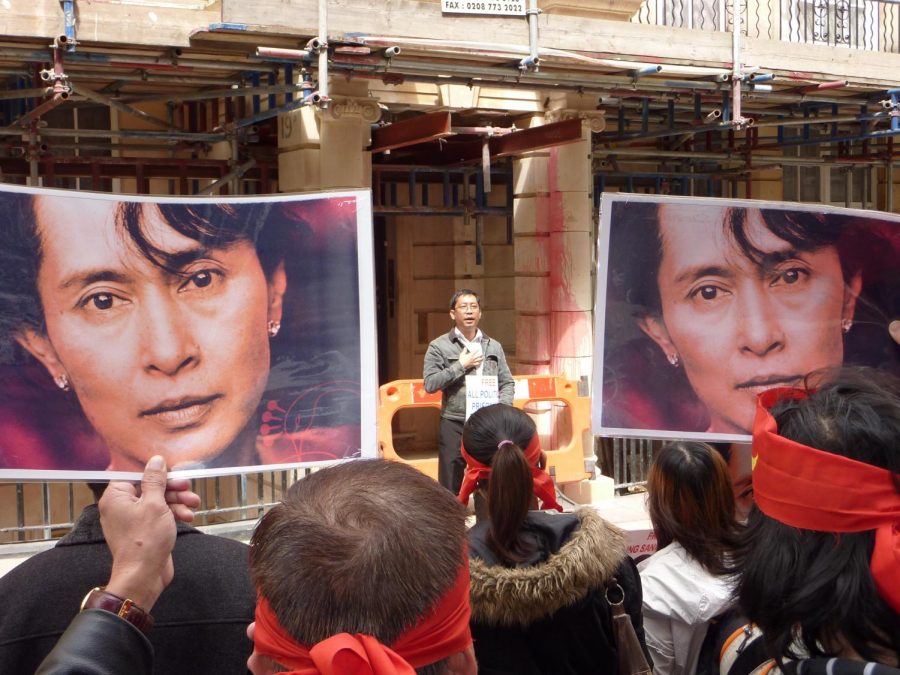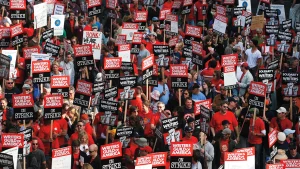Rohingya refugees flee ongoing genocide in Myanmar
International Community stays silent
This image was taken in 2009 before Aung San Suu Kyi was elected as State Counsellor to Myanmar. The genocide that has been perpetrated against Rohingya Muslims within her country has jeopardized her approval rating, especially among the international community.
January 23, 2018
In a recent poll conducted by our Student News Site, just one fourth of participants were aware of the devastating human rights travesty occurring in the country of Myanmar. Within this lush and tropical country situated between Thailand and eastern India, looms a dark secret which the International Community has all but ignored in recent months. An innocent minority in a country which has long been impacted by racial and religious violence is being targeted by an orchestrated ethnic cleansing.
International observers envisioned a very different future for Myanmar just three years ago. The dissolution of its military dictatorship and the election of civil rights icon Aung San Suu Kyi signaled a new era where democracy would reign in this impoverished nation. But unfortunately, reality has painted a very different picture. Current estimates speculate that two-hundred to three-hundred thousand Rohingya Muslims have fled Myanmar, formerly Burma, since 2012. Rohingya Muslims have been persecuted by Myanmar for decades but recent events suggest that a campaign to eliminate this ethnic group is well under way. Rohingya Muslims have been discovered in mass graves in the Rakhine State of Myanmar which borders the Bay of Bengal. In these graves are men, women, and children. Those who managed to escape the genocide shared with international observers that women were repeatedly raped, children were publicly tortured, and men were executed indiscriminately. Myanmar’s military has burned down Rohingya villages and rounded up entire communities. Fleeing citizens that are caught escaping across the border are shot on sight, according to some reports. Other news organizations have reported that Myanmar’s refugee camps and aid facilities have been repurposed as ‘concentration camps’ where Rohingya Muslims are starved and murdered. A painful aspect to seeing this genocide unfold is that similar acts were perpetrated against minorities prior to the Bosnian and Rwandan Genocides. Rohingyas are forbidden to come and go as they please in these camps. Essentially, they have been imprisoned within these facilities. Other non-Rohingya groups who inhabit the Internally Displaced Camps (IDCs) are segregated from Rohingyas and are welcome to roam outside the camp.
Aung San Suu Kyi is the Myanmar equivalent of Martin Luther King Jr or South Africa’s Nelson Mandela. She spoke out against Burma’s repressive regime in the 1990’s and was imprisoned for promoting a progressive agenda. While under house arrest, she received the 1991 Nobel Peace Prize for her efforts to bring peace to the nation. During a twenty-one year period, Aung San Suu Kyi spent fifteen years under house arrest. In 2015, she was elected Prime Minister. Because her ex-husband was British and she was the mother of foreign-born children, she could not be Prime Minister according to the country’s amended constitution. So, a new post was developed for her instead. She was appointed State Counselor. Her supporters and critics have argued that her lackluster response to the atrocities demonstrates her complicity in the violence perpetrated by the government. She told reporters that the military’s admission to the murders of ten Rohingya Muslims is a positive step in the right direction. Most people, however, have argued that she has not done enough and is prolonging one of the worst genocides in her country. Although Kyi is considered the country’s de facto leader, she does not possess the authority to intervene or control the army. Her father is considered the founder of Myanmar who ruled immediately after Britain relinquished its control of India in 1948. His assassination and the socialist dictatorship which succeeded him stirred and ignited ethnic violence in the country and has done so ever since. Aung San Suu Kyi has expressed distrust for muslims in Myanmar and has displayed a preference for Buddhists who make up the country’s majority. Extremist monks have preached to worshippers that Rohingya Muslims must be exiled from Myanmar or be executed because they are inferior and endanger the country’s stability.
According to genocidewatch.com, “The violence [in Myanmar] has occurred in the context of rising Burman-Buddhist nationalism, and the growing influence of the monk-led “969” movement that preaches intolerance and urges a boycott of Muslim businesses. This is a dangerous combination: considerable pent-up frustration and anger under years of authoritarianism are now being directed towards Muslims by a populist political force that cloaks itself in religious respectability and moral authority.”
Americans and Europeans have a history of turning a blind eye to the chaos that erupts in other countries. A military intervention by the United States or Britain would be poorly received by foreign governments which leaves diplomacy as the primary course of action to ensure the safety of muslims. If the UN believes that there is credible evidence to support the existence of a genocide in Myanmar, then it must decide whether to intervene and send peacekeepers to prohibit further violence. Peacekeepers have proven to be an ineffective solution in instances of genocide. In fact, during the Rwandan Genocide, Peacekeepers had to abandon their mission and flee the country. The Tutsis, an ethnic group of Rwanda, were bludgeoned by Hutu rebels who attacked UN Refugee Camps. When orders were received by troops to abandon their posts, Peacekeepers gathered white westerners and fled from the camps, leaving helpless Tutsi men, women, and children to fend off Hutu slaughterers.
A report that was commissioned by the United Nations to learn from the mistakes it made in Rwanda states that, “The departure of peacekeepers from a school where thousands of civilians had massed hoping for protection was cited by the report as one of the main reasons for the enduring bitterness Rwandans feel Thursday toward the United Nations because of the ensuing massacre there. ‘”The manner in which the troops left, including attempts to pretend to the refugees that they were not in fact leaving, was disgraceful,”’ the report said.” Remaining U.N. Peacekeepers fled the region when “rampaging killers in Rwanda killed 10 Belgian peacekeepers at the beginning of the genocide…there was little will to keep the peacekeepers in place, much less strengthen their mandate.”
Bangladesh has agreed to send 300 Rohingya Muslims to Myanmar each day for 2 years as a method of repatriation which endangers those who risked their lives escaping. The UN, who has called the events in Myanmar a textbook example of ethnic cleansing, has done little to stop the inhumane treatment of this vulnerable minority. Rohingya Muslims are not considered citizens by the Myanmar government which begs the question, “Why does Myanmar want the Rohingya to return?” If Myanmar despises this minority, the only advantage they gain from their repatriation is prolonged ethnic cleansing of the Rohingya.
In Forsyth County, it is easy to ignore atrocities taking place on the other side of the world. If you are interested in donating money to assist Rohingya refugees, visit UNHCR, The UN Refugee Agency to make a tax deductible donation. In Clarkston, GA, a city located in Dekalb County, there is a charitable organization called the Burmese Rohingya Community of Georgia INC that is a non-profit which collects donations for Rohingya refugees and hosts rallies and marches in Atlanta to raise awareness of the ongoing genocide.
You can find our poll on our website and can share it via social media to spread awareness.





